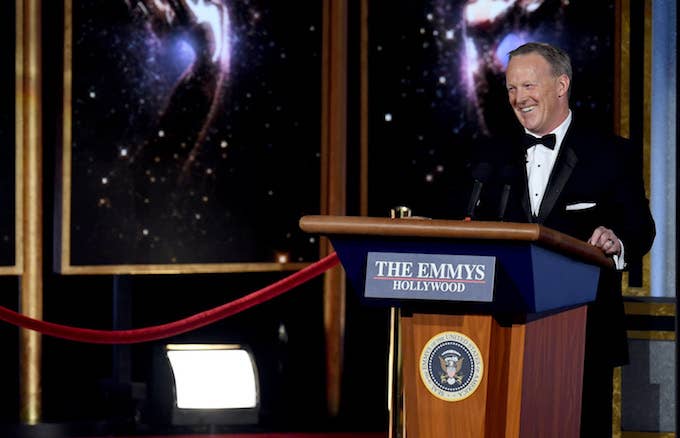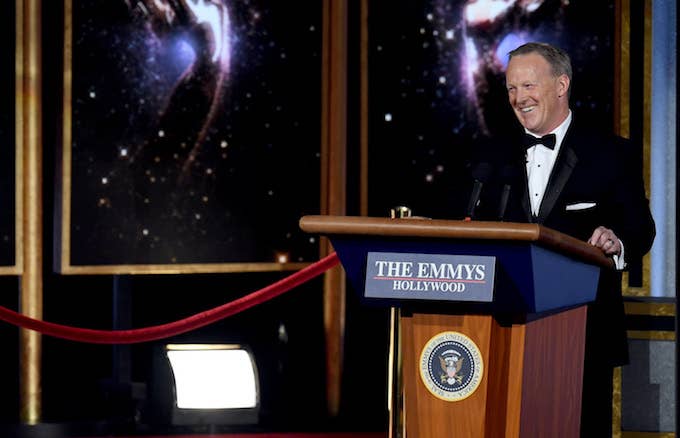
For better or for worse, award shows—like the content they celebrate—reflect the world in which they’re produced. Given the current sociopolitical climate in the United States, every ceremony is going to be pitched and viewed as a referendum on the media industries and ongoing culture wars. The2017 Primetime Emmy Awards were no different, but from the opening monologue onward, Hollywood revealed the hypocrisy of its Resistance-baiting woke period.
Predictably, much of Sunday’s telecast was spent navigating two predominant narratives: 1) that of emergent diversity and inclusion among the nominees and the industry writ large and 2) that of an anti-hate, anti-bigotry, and anti-President Trump vision for the world. Number one of course feeds directly into number two, with the Television Academy, host Stephen Colbert, and a cavalcade of presenters and winners speaking to Hollywood and art’s role in building progress.
The winners did indeed reflect a level of diversity not typically seen by the Emmys, even in recent years as all major award shows have fought against legitimate claims of racism. Atlanta’sDonald Glover won two awards, becoming the first black winner in the comedy directing category. Master of None’s Lena Waithe is the first black woman to win on the comedy writing side. They are joined by fellow non-straight, non-white, or non-male winners in major categories like Reed Morano (the first female winner in drama directing in over two decades), Aziz Ansari, Riz Ahmed, Kate McKinnon, and Sterling K. Brown (the first black actor to win since 1998).
Other winners were similarly couched as exemplars of non-dominant voices or stories. The Handmaid’s Tale is the feminist dystopia. Big Little Lies is the story of female friendship, crafted by very famous women from a book written by a woman. Black Mirror’s “San Junipero” follows burgeoning love between two women. Veterans Veep and Saturday Night Live and Last Week Tonight are the topical critiques that highlight the absurdity of our lives that we need to get through the week. Speech after speech alluded to, or directly addressed, the current White House administration—generally followed by a wave of applause.
That applause came off as enormously self-satisfied, particularly in light of how Colbert, the telecast’s producers, and many in the room showed their true vision for inclusion in 2017. On a very basic level, while it’s great that so many non-white dudes took home trophies, there should be deeper consideration for how we made it to this year and there are still significant firsts for minority winners across many categories.
Worse, the show itself couldn’t stop erasing the goodwill earned by one of the best crops of winners in recent memory. Sean Spicer’s appearance in the opening monologue is the singular moment everyone will be talking about for the next 24 hours, and with good reason. While Colbert got his shots in on Spicer by referring to the former White House press secretary as Melissa McCarthy, riffing on the actress’ infamous SNL characterization, and again in the following segment, the decision to allow Spicer on that stage in this context is no different than what Jimmy Fallon did with then-presidential candidate Donald Trump in 2016. Fallon was rightfully roasted for his softball treatment of Trump, to the point where people point the moment as evidence for why his Tonight Show ratings have taken a hit.
Colbert, meanwhile, has positioned himself as the harder hitting late night host, pulling his show out of an early slump on the back of his supposedly cutting takes on the Trump administration. And yet, here he is, agreeing to a bit that treats Sean Spicer as a safe, friendly target for playfulness—and not one worthy of legitimate critique for his role in perpetuating the same hate Spicer’s former boss embodies. Fallon has admitted that he should have been better; so what is Colbert’s excuse here?
The same can be said for the Emmys rediscovered affair with SNL, which won more major awards tonight than it has in decades—including for Alec Baldwin’s endless portrayal of Trump. Like Fallon, SNL gave candidate Trump a massive platform when his campaign platform was already quite clear That, among Hollywood, SNL didn’t take the same heat that Fallon experienced, and then has subsequently been reinvigorated as valuable, needed “political critique” tells you most of what you need to know. That Baldwin gave a speech that began with a complaint about his wife not wanting to have sex with him and then finished with some lines about how when we die, all we we remember are movies and TV shows and not bills passed by Congress or laws established by the Supreme Court tells you a little more.
If that wasn’t enough evidence of how compromised Hollywood’s message of diversity and inclusion was, just replay two speeches late in the telecast: one by Big Little Lies’ Nicole Kidman and Reese Witherspoon and one by This Is Us’ Sterling K. Brown. While the former were given significant time to deliver their message about (white) women and (white) female-driven stories, the latter, a back-to-back winner, an extremely popular black actor, and perhaps the biggest stone-cold lock of the night coming into the show, was cut off midway through an eloquent, positive speech of his own. No disrespect to Kidman or Witherspoon; their speech was great. But the contrast between those two moments illustrates that in Hollywood, star power—particularly movie star power—trumps everything, including hate.
By default, award shows will always deliver a complicated vision of the future. Across film and television in particular, the desire to reify all the good—whether that be good content or political or social good—the industry is supposedly doing will always come first. The celebratory attitude is to be expected from a party for rich people by rich people, even as only small (but meaningful) change actually occurs. However, in refusing to acknowledge its complicity in getting us to this point and then subsequently doubling down on those attitudes, Hollywood displays how it really feels. All this? It’s mostly for show.

